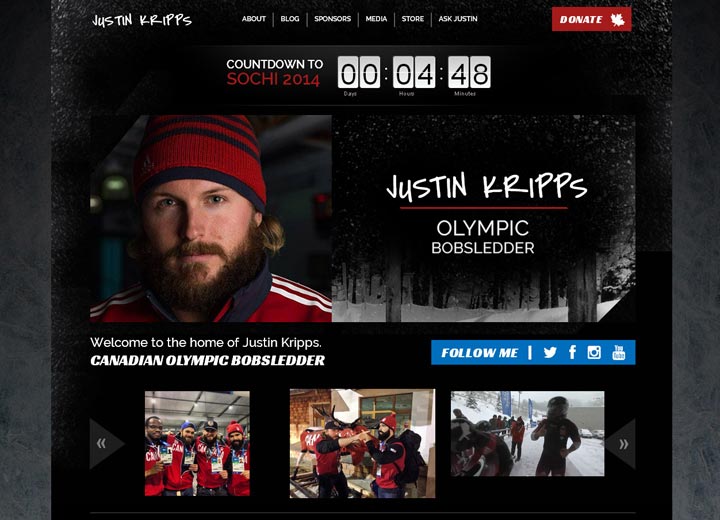TORONTO – Canadian Olympic bobsledder Justin Kripps’ personal website has been blocked in Russia, the Citizen Lab at the Munk School of Global Affairs confirmed through tests on Friday.

But it also said it did not believe it was blocked on purpose.
“This evidence indicates that the Olympian’s site is likely not the intended target of blocking. Instead, this appears to be an example of collateral filtering, where crudely implemented attempts to block a website inadvertently lead to the blocking of other sites hosted at the same IP address,” a post on the Citizen Lab’s website said Friday.
“Russian authorities have been quoted as warning website owners which share IP addresses to ‘check who your neighbours are.'”
Kripps announced on Twitter early Friday morning that his website – where the athlete posts blog updates and interacts with fans – had been blacklisted in Russia.
READ MORE: Canadian Olympic bobsledder Justin Kripps’ website blacklisted in Sochi
When accessed the website displayed a message in Russian that listed “possible reasons for limiting access.”
Here is a Google Translation of the text:

Get breaking National news
Dear users!
We apologize, but access to the requested resource is limited.
Possible reasons for limiting access:
Access is limited by court order or otherwise established by the legislation of the Russian Federation.
Network address, which identifies the site on the “Internet”, included in the Uniform Domain Name Registry, indexes pages sites network “Internet” and the network address for the identification of sites in the “Internet”, containing information dissemination in the Russian Federation is prohibited.
Check availability network address in the Unified Register in the section “Viewing the Registry” online http://www.zapret-info.gov.ru.
Network address, which identifies the site on the “Internet”, included in the registry of domain names, indexes pages of sites in the “Internet” and the network address for the identification of sites in the “Internet”, containing information disseminated in violation of the exclusive rights.
Check availability network address in the Register in the section “Viewing the Registry” online nap.rkn.gov.ru.
READ MORE: Global research group to study how the Internet should be governed
- Donald Trump claims B.C.’s ‘very large faucet’ could help California’s water woes
- Canada must speed up progress to hit its 2030 emissions target: report
- U.S. TikTok ban case pits free speech vs. national security. Which will win?
- A final, tragic text from doomed Titan sub revealed at Coast Guard hearing
One of Russia’s most talked about policies leading up to the Olympics was the anti-gay propaganda law, which bans any pro-gay “propaganda” that could be accessible to minors.
After Kripps discovered his website was blocked, some speculated that he had fallen victim to the strict anti-gay law.
Kripps’ website does not appear to have any “pro-gay propaganda” on it, however, on Feb. 6 the Canadian athlete tweeted a link to a video from the Canadian Institute of Diversity that directly addresses the controversial law.
READ MORE: Video: ‘The Games have always been a little gay’
“The Games have always been a little gay,” reads the tagline of the video. “Let’s fight to keep them that way.” Due to the design of Kripps’ website, his tweets are automatically pulled into the homepage of the website in a “newsfeed” format.
Kripps also gained attention after he tweeted a photo of himself and his teammates posing in their underwear in their bobsled in January. The photo was then posted on celebrity gossip website PerezHilton.com and Outsports.com, which promotes gay sports.
Russia has come under fire before for allegedly censoring content.
In March, Russia’s commutations regulators requested that Facebook, Twitter and YouTube removie material that the officials deemed “objectionable.”
According to a report by The New York Times, the agency requested that YouTube remove a video that they said promoted suicide. Google-owned YouTube refused, saying that the content was merely a tutorial showing users how to make a fake wound.
The law, which was put in place in November, was intended as a child protection law aimed at thwarting child pornography and content about drug use or suicide.
In December Google’s executive chairman Eric Schmidt said publically that he was worried Russia was leaning towards China’s style of Internet censorship – often referred to as the “Great Firewall.”









Comments